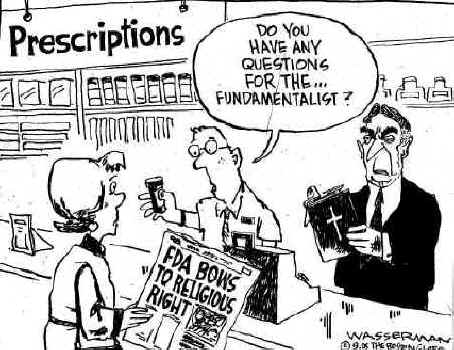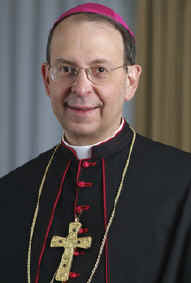Editor’s Note: Catholic
doctrine can make it impossible for doctors at Church-owned hospitals to offer the
same medical care as is available at non-religious-affiliated facilities.
This is unfair to patients who need a treatment proscribed by the Church, particularly if the patient
isn’t even Catholic. As you might
expect, I believe that, when there's a conflict between medicine and religion,
medical science should take precedence. But we live in a country that’s
become overbearingly theocratic and conservative (like Teheran, with priests, instead of ayatollahs), so this is probably not a popular position. As was the case with a previous
article on priests and child molestation, I'm pretty sure some readers are
going to call this piece “Catholic bashing.”
Separation of Church and
Hospital
Mormons don’t own liquor stores. Orthodox Jews don’t
cater pig roasts. And maybe it’s time to consider whether the Catholic Church
should be less deeply invested in our healthcare system.
Democrats in Connecticut’s legislature have inserted
language into next year’s budget to withhold funding from four Catholic
hospitals that deny emergency contraception to rape victims. Republican
lawmakers countered with an amendment deleting this provision; however, the
Democratic majority delayed debate long enough to prevent the amendment from
being acted on, ending the session with a filibuster in which one Democratic
representative related Jesus’ story of the Good Samaritan.
This parable is more than just a filibuster, however.
Who needs assistance and Christian compassion more than a woman who’s just
been violated? And who needs a morning-after pill more than a rape victim? The
last thing a woman needs is to be told she can’t have a treatment she may
desperately want because her hospital’s theology forbids it.
The issue here isn’t the morality of abortion or
whether contraception is sinful or even if the Plan B contraceptive is actually
an abortifacient. Americans will be debating these issues long after anyone
reading these words is dead and buried. The relevant fact is this: According to
the laws of the United States, as interpreted by the Supreme Court, these are
lawful medical procedures.
In non-theocratic societies, when medical care collides
with theological dogma, medicine should take precedence, especially when the
healthcare prescribed is completely legal. It makes no more sense to allow
Catholic hospitals to deny emergency contraception than it would to enable
Jehovah’s Witnesses to prevent surgery patients from receiving blood
transfusions or to encourage Christian Scientists to buy up hospitals in which
all medical care beyond prayer and faith healing is forbidden.
I don’t want the College of Cardinals determining
appropriate medical treatment. Nor do I want Scientologists deciding what
services a hospital should offer, based on L. Ron Hubbard’s odd beliefs, and
Tom Cruise shouldn’t be dictating what antidepressants a woman could take
postpartum. Fortunately, I’ve never seen a large public healthcare facility
owned and operated by Scientologists or Christian Scientists.
Which brings us to the crux of this matter:
Where is it written that the Roman
Catholic Church needs to own and operate hospitals?
Healthcare is big business, and there are plenty of
large corporations willing to run enterprises as profitable as hospitals. The
Catholic Church is also a big business, and it’s free to buy real estate
agencies, laundromats and department stores if it wants them. But, if its
doctrines prevent it from abiding by the law of the land, maybe it should leave
the administration of hospitals to less-sectarian organizations.
|
|
|
 |
|
Some feminists have complained about Wal-Mart’s
refusal to offer Plan B contraception in its pharmacies, but that’s a slightly
different situation. Wal-Mart hasn’t yet put all its competitors out of
business, so customers can still go elsewhere if they need products proscribed
by the retailer’s Arkansas Bible Belt management philosophy. If the company
chooses to apply its somewhat fundamentalist mentality to its product inventory, there’s no real
harm done.
However, unlike the patrons of big box stores, people who
need hospital care are often a “captive audience.” In many places, a
Catholic hospital may be the only such facility in the local area. And people in
emergency situations, such as rape victims, often have little choice about where
they’re taken. |
| Connecticut’s Catholic bishops have called the
legislature’s budget provision part of the “abortion rights agenda,”
“Catholic bashing” and “extortion,” and Bridgeport Bishop William Lori
asserts that the church merely wants to “not be interfered with by the
government.” However, Lori’s objections are nonsense ― a bill that
would have mandated administering Plan B contraception to rape victims died in
committee earlier this year, following intense lobbying by the Connecticut
Catholic Conference. The issue really comes down to money. |
|
 |
|
|
|
This matter is analogous to a recent suit brought by law
schools determined to keep military recruiters off campuses because of the armed
services’ “don’t ask, don’t tell” policy on homosexuality. In an 8-0
ruling, the Supreme Court sensibly asserted that colleges were free to protest
military policies they found immoral, but, for the schools to continue receiving
federal funding, they had to grant access to the recruiters. Similarly, if the
Catholics want their share of Connecticut’s tax dollars, they should be
subject to the same regulations that govern non-denominational hospitals.
Finances aside, emergency contraception could present a
dilemma for Catholic doctors. However, those with moral objections to
contraception are not being forced to risk excommunication or eternal damnation
as a result of the Connecticut legislature’s ruling. No individual is being
compelled by statute to choose medicine over personal dogma.
And perhaps the whole problem could be eliminated if the
Catholic hierarchy could accept that separation of church and hospital may be an
idea whose time has come.
Click here to return to
the Mark
Drought home page.

